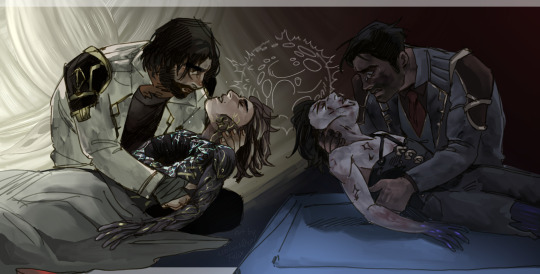24 | México | Still trying to find myself while acting as an adult as best I can.
Don't wanna be here? Send us removal request.
Text
I don't feel that I have enough inspiration to write a Jayvik fanfic. But, since it's kinda canon that Ambessa likes twinks, I imagined a scene where she subtly flirts with Viktor, and Jayce gets so jealous. 🌿
Teeheehehehe🙂↔️


Also, there is a scene en season 1 where Ambessa is with this man in the tub in front of Jayce, so he definitely knows her preferences. 👹
Jayce would instantly notice if she is flirting with his man 🙂↔️
2K notes
·
View notes
Text
Polyglot Checklist for Setting Reasonable Language-Learning Goals for 2025:
List out your languages (main(s), target(s), side(s), etc.).
Write 1-3 main areas of focus, project ideas, books to read, films to watch, studies to complete for each language. If you have more than 3, you might list 3 main and 1-3 side aspects you would like to focus on. If you are unsure what to focus on, consider your strengths, weaknesses and as of yet unexplored topics related to the language or culture in specific, then choose 1-3 aspects which speak to your interests the most (regardless of whether they are connected to your strenths, weaknesses or the unexplored).
After making your list, view the points you've listed en masse. Rank the activities in order of most-to-least intersting or most-to-least crucial to your studies and long-term aims.
Now, look at each point again. Ask yourself: how long would it take me to complete this task if it were in my native language? How long if I had C2 level? B2 level? A2? Ask yourself: given my current knowledge base/level, usage (vocabulary + grammar + accuracy with or without resources), and access to the materials required to engage with these points/aspects, how long would it take me to prepare, collect resources, study, and practise/learn the skills/vocabulary/grammar required to engage with each of these points?
Ask yourself: Is my focus something that requires time in order to achieve? Is this skill a grape on a vine to be ripened? Is it a bottle to be cracked open? (For example: If, say, your goal is to write a short story in your target language and you already have a working knowledge of sentence structure and the tenses most required to write fiction in that language, you may be working with a bottle. Expanding your vocabulary/range of expression in order to improve your writing in that case is simply adding spice to mull the wine. But if you are still in the growing phase, your skills hang as grapes you must cultivate in a rich soil. Tend to them first.)
Use this reflection to help you reconsider your list, but do not do away with it entirely. These are interests which you may return to at a later time or in a future level.
Ask yourself (whether you like to focus on one task/language or more at a given time): what are reasonable expectations for me to have for myself, my time, my learning and my output at my current level and considering all my other interests and obligations?
196 notes
·
View notes
Text

Never back down never what? Cause if you thought I was joking when I said I was going to draw everything in this style…
38K notes
·
View notes
Text

The Christmas Dream byJules Tavernier Harper's Weekly, New York, 1871.
266 notes
·
View notes
Text

Christmas Eve at the Grave. Otto Hesselbom, 1896
4K notes
·
View notes
Text

'The Ghost Story' by Alfred Bestall, 1930.
3K notes
·
View notes
Text

Illustration from Lord Dunsany's 'The Gods of Pegana' by Sidney Sime, 1905.
2K notes
·
View notes
Text

'Children of the Forest' by Elsa Beskow, 1910.
712 notes
·
View notes
Text


I did not exactly plan to do any fanart but this idea was too good to pass up
18K notes
·
View notes
Text
Jayvik stuff I drew in school


^ Almost dead and his biggest problem is being bisexual smh BTW I love me a good poly ship but oh soo not them,,, Mel should go and kiss Lest on the lips I think
7K notes
·
View notes



